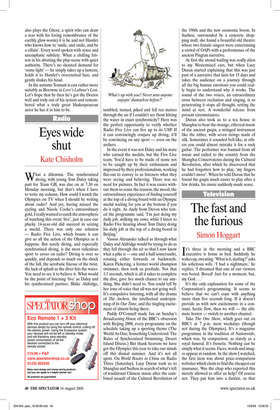Radio
Eyes wide shut
Kate Chisholm
What a dilemma. The synchronised diving, with young Tom Daley taking part for Team GB, was due on at 7.30 on Monday morning, but that’s when I have to write my column. How could I watch the Olympics on TV when I should be writing about radio? And yet, having missed the cycling and Nicole Cooke’s extraordinary gold, I really wanted to catch the atmosphere of watching this event ‘live’, just in case our plucky 14-year-old did succeed in seizing a medal. There was only one solution — Radio Five Live, which boasts it can give us all the action of the Olympics as it happens. But surely diving, and especially synchronised diving, is the most ridiculous sport to cover on radio? Diving is over so quickly, and depends so much on the shock of the fall, the acrobatic finesse of the twist, the lack of splash as the diver hits the water. You need to see it to believe it. What would be the point of listening ‘live’ as Daley and his synchronised partner, Blake Aldridge, tumbled, turned, piked and fell ten metres through the air if I couldn’t see them hitting the water in exact synchronicity? Here was the perfect opportunity to verify whether Radio Five Live can live up to its USP. If it can convincingly conjure up diving, it’ll be convincing on any sport — even on the archers.
In the event it was not Daley and his mate who earned the medals, but the Five Live team. You’d have to be made of stone not to be caught up by their enthusiasm and impressed by their professionalism, working flat-out to convey to us listeners what they were seeing and believing. There was no need for pictures. In fact it was easier without them to sense the tension, the mood, the extraordinary experience of finding yourself at the top of a diving board with an Olympic medal waiting for you at the bottom if you do it right. As Andy from Devon who texted the programme said, ‘I’m just doing my daily job, milking my cows, while I listen to Radio Five hearing about Tom Daley doing his daily job at the top of a diving board in Beijing.’ Vassos Alexander talked us through what Daley and Aldridge would be trying to do as they fell through the air so that I now know what a pike is — one and a half somersaults, rotating either forwards or backwards. Karen Pickering, a former world champion swimmer, then took us poolside. Not that 1.5 seconds, which is all it takes to complete the dive, gave her much chance to say anything. She didn’t need to. You could tell by her tone of voice that all was not going well. It’s compulsive listening, with all the drama of The Archers, the intellectual underpinning of In Our Time, and the tingling excitement of almost being there.
Paddy O’Connell made fun on Sunday’s Broadcasting House of the BBC’s obsession with Beijing 2008, every programme on the schedule taking up a sporting theme (The World As One; Something Understood: The Rules of Synchronised Swimming; Desert Island Discus.) But thank heavens we have got the Olympics this year to take our minds off this dismal summer. And it’s not all sport. On World Routes in China on Radio Three (Saturday), Lucy Duran took us to Shanghai and Suzhou in search of what’s left of traditional Chinese music after the combined assault of the Cultural Revolution of the 1960s and the new economic boom. In Suzhou, surrounded by a concrete shopping mall, she found a beautiful old theatre where two female singers were entertaining a crowd of OAPs with a performance of the ancient Pingtan narrative.
At first the atonal wailing was really alien to my Westernised ears, but when Lucy Duran started explaining that this was just part of a narrative that lasts for 15 days and takes the audience on a journey through all the big human emotions you could really begin to understand why it works. The sound of the two voices, an extraordinary cross between recitation and singing, is so penetrating it stops all thought, setting the mind at rest. A wonderful release from present circumstances.
Duran also took us to a tea house in Shanghai to hear the strange, ethereal music of the ancient guqin, a stringed instrument like the zither, with seven strings made of silk. Sometimes it sounded bell-like, at others you could almost mistake it for a rock guitar. The performer was banned from all music and exiled to the country from the Shanghai Conservatoire during the Cultural Revolution, after which he discovered that he had forgotten how to play, ‘my fingers couldn’t move’. When he told Duran that he found the guqin much easier to play after a few drinks, his music suddenly made sense.


























































 Previous page
Previous page